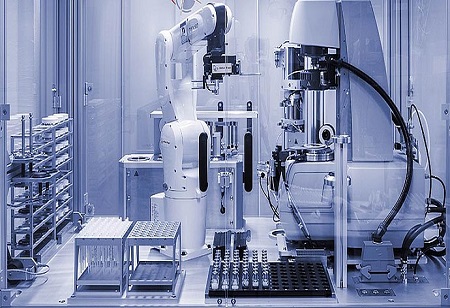Massive amounts of
healthcare data are produced every minute, and important information is pulled from it. A third of all global data volume is being produced by the healthcare sector. Also, until 2025, the growth of healthcare data is projected to average more than 30% annually. Due to the enormous number of data required to process essential healthcare data, lab automation is becoming more and more necessary. Millions of swab tests in both private and public labs as a result of the coronavirus's quick spread throughout the world have also boosted the amount of patient data. Companies have changed their attention to automation and are using robotic lab equipment for testing and result processing to stop the COVID-19 epidemic.
Today's busy laboratories are under growing pressure to increase throughput, efficiency, and quality, and they frequently have to use all of their available resources and personnel. For labs of all types, sizes, and specialties, managing complicated tests, numerous procedures, and labor-intensive sample preparation create substantial obstacles.
To replace manual, repetitive activities, boost throughput, and enhance quality, many labs use laboratory automation.
Lab automation technology and
laboratory automation products can be a game-changer for these labs, whether it's a single piece of hardware, like a pipette machine or an automatic aliquoting machine, or an entire process automation. Some of the key
advantages of lab automation that have led to revolutionizing the healthcare industry include Reproducibility (quality), data correctness, efficiency, and others.
Reproducibility
For laboratories, reproducibility has always been of utmost importance. A 2011 Nature poll that discovered 70% of scientists had attempted and failed to duplicate another scientist's findings brought to light the pervasive problem of reproducibility.
Automation has the potential to decrease contamination and handler-induced variability, improving the quality of outputs. For instance, in a research setting, laboratory automation can allow for faster experimental data collection, a larger volume of results, and the use of a wider variety of controls, improving the possibility that results will be repeatable.
To increase laboratory productivity,
Siemens Healthineers specializes in Aptio automation, intelligent technology, and provides cutting-edge robotics solutions. By fusing intelligent technology with workflow, Aptio Automation enables to enhance productivity, improve usage of lab resources, accelerate processing, and achieve consistent Turnaround Time (TAT). Siemens Healthineers has 18,000 patents worldwide and more than 170 years of experience, according to the business website.
